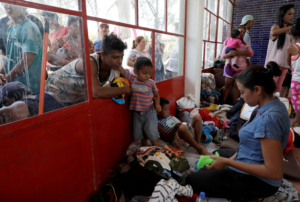US refugee policy is having global ramifications
The US winding back its once generous refugee resettlement program is having unintended consequences in terms of US influence around the globe, according to human rights experts
Since the end of the Vietnam War, the US has resettled more than 3.4 million refugees through its humanitarian programs.
And although this looks like a large number and US was for many years the largest resettlement country for refugees, it is a fraction of the millions of people who have been seeking a safe haven over the past four decades.
But according to Bill Frelick, the refugee rights program director at Human Rights Watch, has been a critical tool the US government has used to “leverage support for countries on the front lines of refugee crises, and to convince them to uphold the rights of the vast majority of refugees living in camps and ghettos who may never be resettled.”
In a recent article, Mr Frelick said President Donald Trump’s slashing of resettlement numbers to the lowest point in the program’s history has upended the delicate burden-sharing equilibrium between the United States and front-line countries that has sustained millions of refugees during their protracted exile.
“Plummeting resettlement numbers have had an enormous impact on all refugee groups – among them Syrians, Iraqis, Afghans, and Sudanese – but perhaps none more so than Somali refugees, nearly a million of whom live in austere and precarious conditions in Kenya, Yemen, and Ethiopia,” he wrote.
In Kenya, when the government there announced in 2016 that it would close the Dadaab refugee camp, then home to 340,000 refugees, US diplomacy used a combination of resettlement, humanitarian funding, and other political pressures to prevent large-scale forced return to Somalia.
Mr Frelick says then President Barack Obama spoke directly with Kenyan President Uhuru Kenyatta about the Somali refugee situation.
“The day after their bilateral talk, Obama played a key role in convening a Leaders’ Summit on refugees, at which 52 leaders and senior officials pledged to increase international responsibility sharing,” Kenyatta wrote.
“Obama helped to corral the richer donor and resettlement countries to increase their funding globally by about $4.5 billion, and to roughly double the number of refugees they pledged to admit.”
“The grand bargain was for front-line countries, like Kenya, to pledge to do more to integrate refugees through education and work programs,” he wrote.
At the time, the US led the donor and resettlement countries by promising to increase its refugee admissions from 85,000 in the 2016 financial year to 110,000 in 2017. It also promised to increase by $1 billion its contribution for humanitarian assistance, bringing its total to about $7 billion.
Mr Frelick says the combination of advocacy and support had a positive result: that November, the Kenyan government said that it would allow the camp to remain open for another six months. The High Court of Kenya later ruled the government’s Dadaab closure order unconstitutional.
But he says the Trump administration did not keep Obama’s promise to increase refugee resettlement, in fact, it slashed it.
In its last year, the Obama administration admitted more than 9000 Somalis. In the first half of this year, the United States has admitted just 27 Somalis.
Somalia was also one of the predominantly Muslim countries included in the Trump Administration’s so called ‘travel ban’.
This is despite the UNHCR, the UN refugee agency, reporting that the Somali situation was one of the world’s most underfunded humanitarian crises.
Mr Frelick points to the announcement in February that the Kenyan government now intends to close Dadaab within six months.
“With waning international support and the reversed course from the US, Somali refugees are back to the situation they faced three years ago, with a short countdown to closure of Dadaab and increasing pressure to return to a country that still represents a threat to their lives,” Mr Frelick said.












